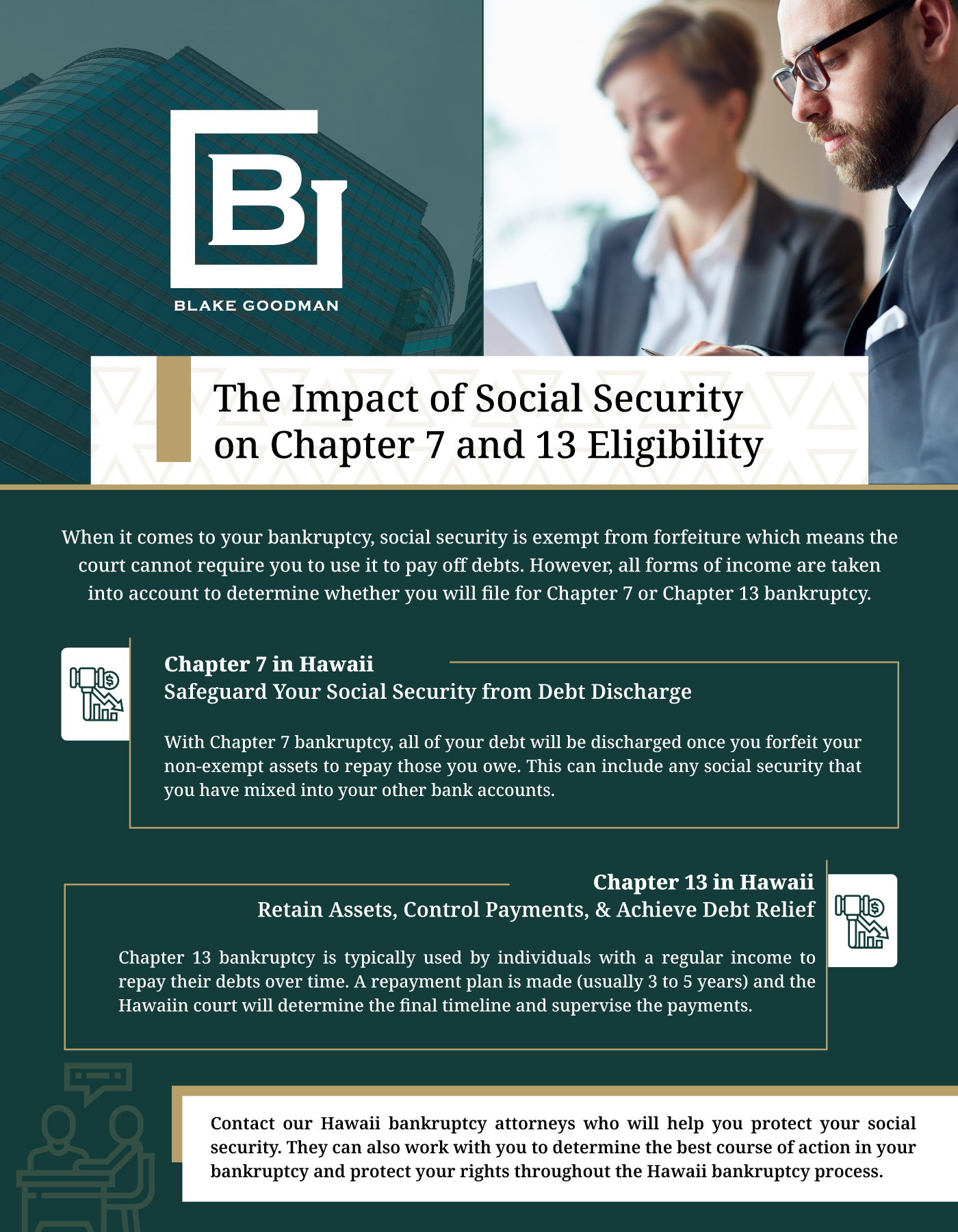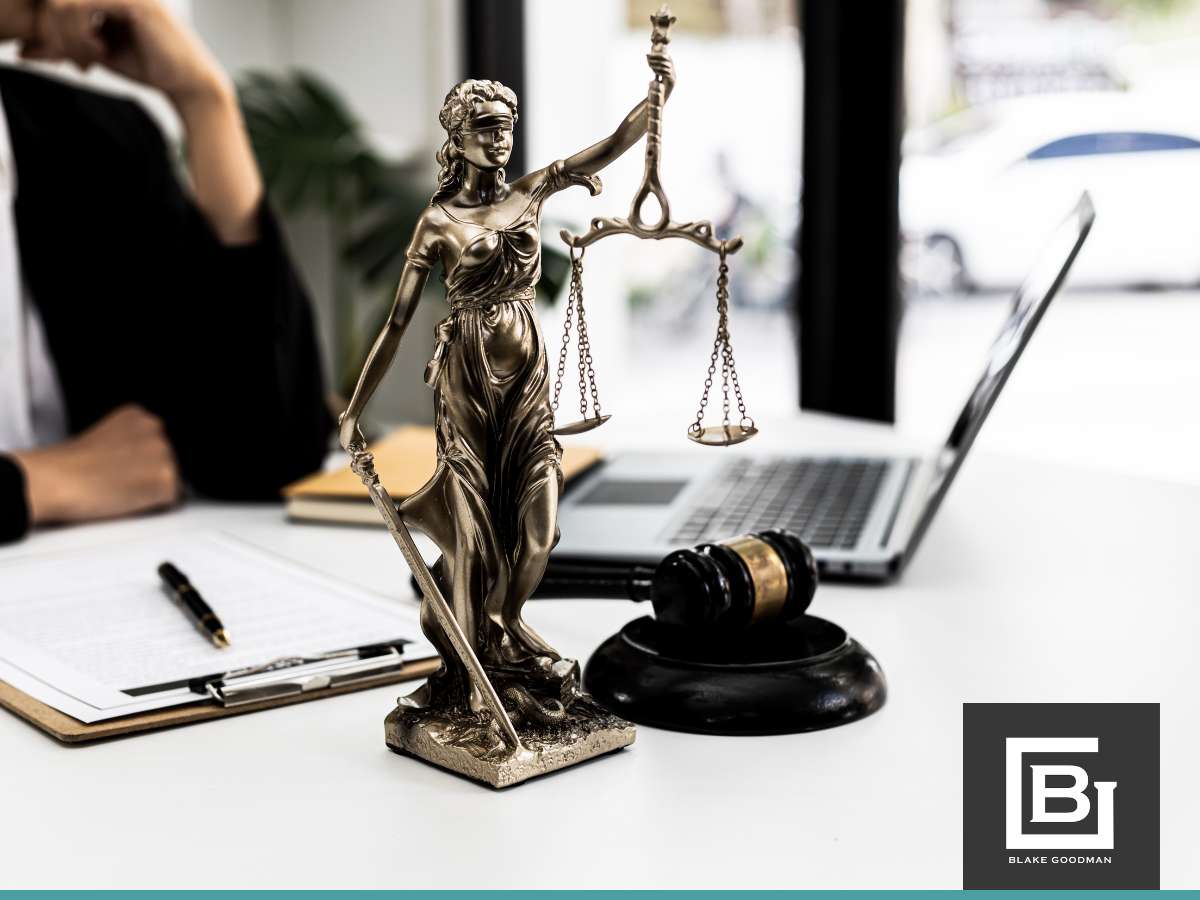Bankruptcy In Retirement: How It Affects Social Security In Hawaii
 When you file for bankruptcy in Hawaii, it is natural to wonder if it will affect your social security benefits, especially if doing so after you’re already retired. The good news is, your social security benefits will stay safe. There will be no change in your eligibility or how much you will be paid.
However, the benefits may influence how your bankruptcy is handled. Contacting your skilled Hawaiian bankruptcy attorney is a good place to start determining how your social security may affect your situation.
When determining how to handle your bankruptcy, the Hawaiian court will consider all of your income to determine how you can repay your creditors. If your social security is being combined into the same accounts as the rest of your money, it will be added to the resources you have.
When you file for bankruptcy in Hawaii, it is natural to wonder if it will affect your social security benefits, especially if doing so after you’re already retired. The good news is, your social security benefits will stay safe. There will be no change in your eligibility or how much you will be paid.
However, the benefits may influence how your bankruptcy is handled. Contacting your skilled Hawaiian bankruptcy attorney is a good place to start determining how your social security may affect your situation.
When determining how to handle your bankruptcy, the Hawaiian court will consider all of your income to determine how you can repay your creditors. If your social security is being combined into the same accounts as the rest of your money, it will be added to the resources you have.
Social Security, Bankruptcy & The Hawaii Exemptions
While your social security may play a role in your bankruptcy, you can rest assured that your bankruptcy does not affect your eligibility for social security. Not only that, but your bankruptcy will not determine or change any amounts or payment frequency or your current or future social security payments. In general, bankruptcy doesn’t affect Social Security eligibility or benefits. Social Security benefits are exempt assets, which means they can’t be used to repay creditors in a bankruptcy case. However, Social Security income can be considered in Chapter 7 bankruptcy eligibility and Chapter 13 bankruptcy repayment plans. In Hawaii, bankruptcy exemptions include:- A portion of earned wages that have not yet been paid
- Public benefits, including public assistance such as welfare and Social Security

The Impact Of Social Security On Chapters 7 & 13 Eligibility
When it comes to your bankruptcy, social security is exempt from forfeiture which means the court cannot require you to use it to pay off debts. However, all forms of income are taken into account to determine whether you will file for Chapter 7 or Chapter 13 bankruptcy. You will be asked to submit a means test which is required of all individuals and couples filing for bankruptcy. On this test, you will report all your sources of income, including social security. This test will be key in determining if you are eligible for Chapter 7 or 13 bankruptcy.Chapter 7 In Hawaii: Safeguard Your Social Security From Debt Discharge
With Chapter 7 bankruptcy, all of your debt will be discharged once you forfeit your non-exempt assets to repay those you owe. This can include any social security that you have mixed into your other bank accounts. To prevent this from happening, get in touch with our Bankruptcy lawyers who will help you protect your social security in a dedicated account. They can also work with you to determine the best course of action in your bankruptcy and protect your rights throughout the Hawaiian bankruptcy process. If you take the means test and your income is higher than Hawaii’s median income for your size household, you may have to consider filing for Chapter 13 bankruptcy.Chapter 13 In Hawaii: Retain Assets, Control Payments, & Achieve Debt Relief
Chapter 13 bankruptcy is typically used by individuals with a regular income to repay their debts over time. A repayment plan is made (usually 3 to 5 years) and the Hawaiin court will determine the final timeline and supervise the payments. In Chapter 13, you do not have to liquidate any of your assets which is a huge benefit for those who can work out a payment plan. However, unlike Chapter 7, your debt is not immediately resolved and you will have to work to repay over several years.How Bankruptcy Can Affect Other Retirement Accounts
 Whether bankruptcy can take a toll on your retirement accounts depends on what type of accounts you hold. Generally, accounts under the Employee Retirement Income Security Act are exempt from being affected.
Accounts that are typically protected include 401(k) and 403(b) accounts, individual IRAs, and Roth IRAs, among a few others. Unfortunately, not all accounts are exempt and may be subject to the court’s access. If you’re unsure whether your account will be affected, reach out to our bankruptcy law firm.
That said, even if your retirement accounts are exempt, you may still be at risk of losing money in them if your combined retirement funds exceed $1,512,350. This limit is re-evaluated every so often and will be adjusted in 2025.
Whether bankruptcy can take a toll on your retirement accounts depends on what type of accounts you hold. Generally, accounts under the Employee Retirement Income Security Act are exempt from being affected.
Accounts that are typically protected include 401(k) and 403(b) accounts, individual IRAs, and Roth IRAs, among a few others. Unfortunately, not all accounts are exempt and may be subject to the court’s access. If you’re unsure whether your account will be affected, reach out to our bankruptcy law firm.
That said, even if your retirement accounts are exempt, you may still be at risk of losing money in them if your combined retirement funds exceed $1,512,350. This limit is re-evaluated every so often and will be adjusted in 2025.
Look No Further For a Top-Rated Hawaii Bankruptcy Lawyer Today!
Are you ready to live debt-free in Hawaii? Our Bankruptcy attorneys at Blake Goodman, PC are here to help! With a variety of resources available to you as well as more than 8,000 happy customers, you can trust that you will get the best service available in your area. Don’t continue living in debt. Contact us and take the steps toward financial freedom!
Blake Goodman received his law degree from George Washington University in Washington, D.C. in 1989 and has been exclusively practicing bankruptcy-related law in Texas, New Mexico, and Hawaii ever since. In the past, Attorney Goodman also worked as a Certified Public Accountant, receiving his license form the State of Maryland in 1988.
Rate this Post





